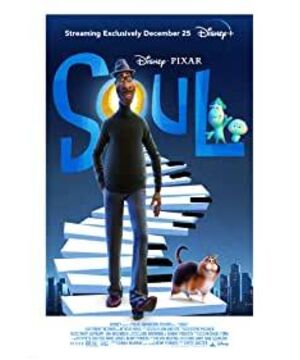1. Jazzing and Buddhism
In my opinion, the themes of The Spiritual Journey are highly similar to those of Buddhism. "The fallen leaves falling into the palms of New York in autumn is the meaning of this world" is like a copy of "one flower, one world"; and the metaphor of people who are too obsessed with goals will fall into monsters, which corresponds to the "ego" of Buddhism. Dzongsar Jamyang Khyentse Rinpoche said that the ego is the most cunning being, it is insatiable and deceives us to pursue worldly illusions. Spiritual Journey shows a world after the wish is fulfilled, "the goal is completed, then what?" Not only is there no miracle and no satisfaction, but instead I feel a trace of emptiness.
So Zen teaches people that when there is desire, there is suffering. 22 said from another perspective, the appropriate attitude towards life is "Jazzing", do whatever you want, pay attention to the current experience, watch a sunset, and watch every performance in the subway. Rinpoche said that we have to learn to enjoy an object by appreciating it without possessing it, to experience it but not to be addicted to it, to feel your fingertips, the moles at the corner of your eyes, like you have never seen them before. How similar are the two mental states of "renunciation" and "Jazzing" in Buddhism.
Some people say that the core of Soul Adventures is just a bowl of superficial modern experience chicken soup. I am not against the idea of "experiencing chicken soup", but I think this kind of chicken soup is not bad. Compared with other options for life, it can even be regarded as Fragrant. There are not many optional answers to the proposition of the meaning of life. We either strive for our goals all our lives, or see everything as nothingness, or choose to experience the present moment. But what Buddhism wants to tell people is that the mentality of persistent pursuit of goals will make you lost, so that you cannot see the infinity of human beings. Paying attention to the changes of all things in a moment can help people get rid of the nihilistic reincarnation and feel the transcendent existence in the beauty of all things. From this perspective, "living in the moment" and "nirvana silence" are one and the same.
2. Facing "I like it, but I'm not good at it"
But this film did not reach the height I expected, because the film's investigation of the meaning of life is too "middle class", too beautiful and gentle, so it loses its sharpness and also loses the perception of pain in many religions And admit that you don't have the courage to be the first to admit that "everything is miserable" before living in the moment.
Revisiting the troubles of the two protagonists: The problem with 22 is that it meets a lot of great people and things, but it's not interested in everything. Gardner's problem is that after he continued to work hard and achieved staged success, he felt empty and empty, and he felt "this is it??".
It has to be said that both of these annoyances are too modern to even "become a problem" in modern times. These are luxury annoyances. So we can only define them as troubles, not "pain".
If we say that there are three kinds of suffering about "getting", the first is the suffering of emptiness after getting it, the second is the suffering of being confused about not knowing what to get, and the third is the suffering of "not being able to ask for it", which is what you want but can't, then undoubtedly the first The three are the most painful, and only those who have penetrated the solution to the third type of suffering and can still embrace life can truly gain the meaning of life. But it is a pity that the third kind of suffering is not shown in the film.
Gardner's experience was not to participate in the performance, but found that even after immersing himself, he still couldn't get the recognition of female performers. He's a genius, so his problem isn't that out-of-reach nothingness. In fact, he also experienced this kind of nihilistic despair in his memory, but what did he think at that time? In the first half of the film, I always thought that Gardner would suddenly lose his sparkle on the stage, and then wondered how to face the love of music after losing inspiration, but this scene did not happen. The movie is too tender for Gardner.
Gardner has talent, and so does 22, so the question for them is where to continue to find passion or motivation after the talent is realized. But for more people, it is not this sense of nihilistic loss of purpose that hinders motivation, but precisely the pain caused by lack of talent, doubts about self mediocrity, anger and rejection of self incompetence. In fact, 22's heart seems to have a bit of that meaning, he is actually very inferior, but this detail is easily resolved by Gardner's simple words of encouragement, and it does not carry the weight it deserves.
So we never doubt that Gardner plays the piano very well, and although he seems like a Luther, he must be successful in his piano career. But that's not us, our problem is that we play the piano badly, and neither is particularly bad, or the kind that doesn't deserve special mention. So sometimes I feel that Gardner's pain is a kind of pain that floats on top of me, but doesn't feel real to me. If Gardner was a worse and struggling person, I might have liked it a little more.
This film is about a story of finding passion and facing talent, it is a story of tender adolescence: "I'm good at it, but I don't know if I like it or not". But another heavy question is "I like it, but I already know I'm not good at it," for which we have to look elsewhere.
View more about Soul reviews











